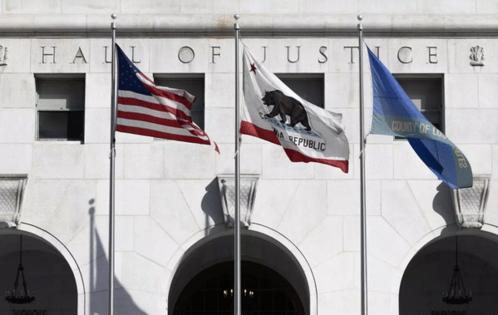California courts sued over failure to ensure transcripts in millions of hearings
Published in News & Features
LOS ANGELES — A new lawsuit alleges that courts across California routinely deny people due process by failing to maintain transcripts of many types of proceedings.
The suit, filed last week by two San Francisco Bay Area legal advocacy groups against the superior courts of Contra Costa, Los Angeles, San Diego and Santa Clara counties, alleges that more than a million litigants are affected statewide each year by a shortage of certified court reporters.
Court reporters are trusted to keep verbatim accounts of sworn testimony and other goings-on inside courtrooms. Certified transcripts are crucial for appeals, and the absence of such records can be a factor in judicial decisions on child custody, domestic violence and other high-stakes legal matters, according to the lawsuit.
The litigation, filed directly in the California Supreme Court in an usual move, comes as advocates have grown increasingly frustrated by the documented inability of many courts to find and hire enough court reporters.
"This is a problem that's existed for more than a decade and just gotten increasingly worse," said Jennafer Dorfman Wagner, director of programs at the Family Violence Appellate Project, one of the two petitioners, along with Bay Area Legal Aid.
Representatives of the superior courts of Contra Costa and Santa Clara counties declined to comment on pending litigation. San Diego County's court spokesperson did not respond to a request for comment Tuesday.
Rob Oftring, a spokesman for the L.A. County Superior Court, emailed a statement that said the court's leadership "is committed to fair and equal access to justice. That includes ensuring all litigants maintain their full appellate rights by having access to a verbatim record of their proceedings when a court-employed court reporter is unavailable and fundamental rights or liberty interests are at stake."
Higher pay offered by private-sector work has compounded struggles to maintain adequate court reporter staffing. Although the public workforce is still able to handle transcripts for criminal proceedings, some civil matters — including family court cases — can be left without anyone keeping an official word-for-word record.
State law permits electronic recording of some proceedings, but not in a wide range of cases involving issues such as domestic violence restraining orders, evictions, small claims and child custody disputes.
Well-heeled litigants can hire court reporters, which can cost more than $3,000 per day. Those without means are left with no way of obtaining an official record, as electronic recording of court cases is not permitted in most instances.
The petitioners are seeking "an order from the California Supreme Court mandating that, when a litigant cannot afford a private court reporter, they are entitled to have the proceeding recorded at no charge, including by electronic recording if a court reporter is not available," according to an emailed statement.
In the superior courts of L.A. and Santa Clara counties, general orders issued this year have cleared the way for judges to allow electronic recording of certain proceedings involving low-income litigants who can't afford to hire court reporters.
Sonya Winner, senior counsel at the law firm Covington & Burling, which is representing the Family Violence Appellate Project, argued that the state's high court needs to intervene to address the situation.
"Without a verbatim record of what happened, it is basically impossible … to have an appeal," she said. "If you get an erroneous ruling, you are out of luck."
©2024 Los Angeles Times. Visit at latimes.com. Distributed by Tribune Content Agency, LLC.







Comments